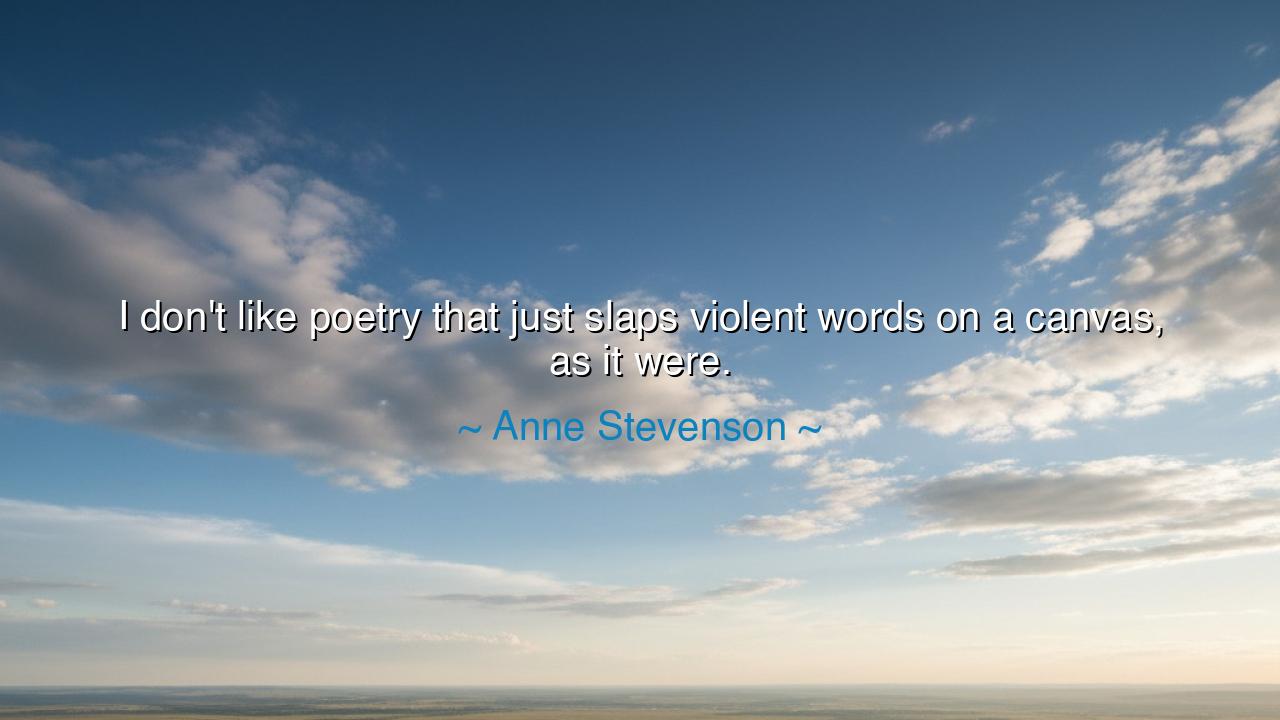
I don't like poetry that just slaps violent words on a canvas






Hear now the wisdom of Anne Stevenson: “I don’t like poetry that just slaps violent words on a canvas, as it were.” These words cut through the noise of false art and remind us of the sacred responsibility of the poet. For language is not a weapon to be hurled without thought, nor a storm to be loosed without meaning. It is a living flame, to be tended with care, shaped with purpose, and offered with reverence. Stevenson speaks against the careless use of shock and brutality, against words spilled for sensation alone, and calls us back to depth, truth, and craft.
The origin of this thought lies in the long struggle between art that illuminates and art that merely provokes. Throughout history, there have been poets who believed that to disturb was enough, that raw noise could pass for vision. But Stevenson reminds us that true poetry is not made by throwing paint upon a wall or shouting harsh syllables into the void. It is made by shaping language so that it pierces, not by force, but by precision—so that its power lasts beyond the moment of impact. A slap stings and is forgotten; a carefully aimed word endures for generations.
Consider the story of Wilfred Owen, poet of the First World War. He wrote of shells, of gas, of dying soldiers. His words were filled with horror, yet they were never careless. They were not violent words slapped on a canvas; they were deliberate, crafted, solemn, carrying the weight of truth. When he wrote, “What passing-bells for these who die as cattle?” the violence of war was present, but elevated by artistry into lament and revelation. In this, Owen shows what Stevenson demands: that power must be married to responsibility, passion to form, brutality to vision.
In contrast, we may recall moments in modern art where violence or obscenity is thrown into verse without purpose. Such works may shock the reader for a breath, but they rarely endure. They are like sparks that flare brightly and vanish, leaving no fire behind. Stevenson rejects this shallowness, this easy attempt at power through raw aggression. For she knew that poetry is not mere outcry but an art that seeks to reveal what lies beneath the outcry—grief, longing, justice, or truth.
This is why she speaks of the canvas. A painter may fling red and black upon a surface and call it rage, but unless the lines, colors, and forms are shaped into vision, it will fade into chaos. So too with poetry: the poet must not simply hurl words, but arrange them into something that breathes. The poem must hold the reader’s gaze, not through shock alone, but through resonance and meaning.
The lesson, then, is clear: do not confuse noise with art, nor violence with strength. The greatest poems may indeed contain violence, but only as a vessel for deeper truth. When the prophet cries out, when the mourner laments, when the warrior recounts the battlefield, the words must be chosen with care, so that their fire is not wasted in sparks but burns steadily into memory. Poetry demands not only passion but discipline, not only energy but vision.
In practice, let each writer examine their own work. Ask not only, “Does this word strike?” but also, “Does it endure? Does it reveal? Does it hold meaning beyond shock?” Read the masters who wrote of blood and sorrow, but who did so with reverence and craft. And if you feel rage, sorrow, or despair, do not merely slap them upon the page—shape them into lines that will echo, not for a moment, but for a lifetime.
Thus Stevenson’s teaching stands: the poet must rise above mere violence of sound and seek the deeper music of truth. For a slap fades quickly, but a well-placed word can wound, heal, and transform across centuries. Let us therefore honor language not as a weapon of noise, but as a vessel of vision, that our poems may live long after the moment of their making.






HPHong Phuong
I’m intrigued by the analogy of ‘slapping words on a canvas.’ Does this imply a concern with aesthetics and deliberation in crafting poetry? Could it suggest that readers are turned off by work that feels haphazard or gratuitously harsh? I’d like perspectives on how poets balance honesty and rawness with careful construction, and whether there are examples of poetry that manage to be both violent in theme yet masterful in technique.
HLNGUYEN HONG LY
This perspective raises questions about how poets communicate powerfully without resorting to blunt violence in language. Are there techniques that convey intensity and conflict more effectively than just using aggressive words? I’m also curious about the historical context: does Stevenson see this as a response to certain movements or trends in modern poetry? Could her statement encourage poets to focus on nuance, metaphor, and layered imagery to achieve emotional impact?
MQle nguyen minh quan
Reading this, I feel curious about her view on the effectiveness of violent imagery in poetry. Does she think that direct confrontation with harsh words can sometimes desensitize readers or feel manipulative? Could it be a critique of style over substance, where shock replaces insight? I’d also like to know how this perspective interacts with contemporary trends in poetry that embrace confrontational or aggressive language as a legitimate artistic choice.
DVLe Duc Viet
This statement makes me wonder about the balance between intensity and craftsmanship in poetry. Is Stevenson suggesting that raw emotion or shock value alone is insufficient without thoughtful structure and language? Could some poets be relying too heavily on provocative words to create impact, rather than exploring deeper layers of meaning? I’d like perspectives on whether poetry should always strive for subtlety and refinement, or if there’s room for intentionally jarring, visceral expression.